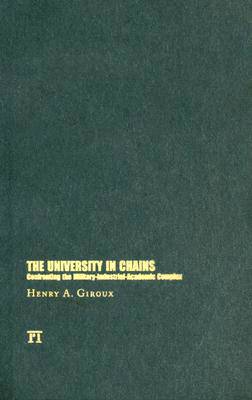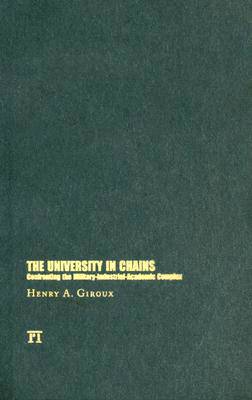
Je cadeautjes zeker op tijd in huis hebben voor de feestdagen? Kom langs in onze winkels en vind het perfecte geschenk!
- Afhalen na 1 uur in een winkel met voorraad
- Gratis thuislevering in België vanaf € 30
- Ruim aanbod met 7 miljoen producten
Je cadeautjes zeker op tijd in huis hebben voor de feestdagen? Kom langs in onze winkels en vind het perfecte geschenk!
- Afhalen na 1 uur in een winkel met voorraad
- Gratis thuislevering in België vanaf € 30
- Ruim aanbod met 7 miljoen producten
Zoeken
€ 381,95
+ 763 punten
Uitvoering
Omschrijving
President Eisenhower originally included 'academic' in the draft of his landmark, oft-quoted speech on the military-industrial-complex. Giroux tells why Eisenhower saw the academy as part of the famous complex - and how his warning was vitally prescient for 21st-century America. Giroux details the sweeping post-9/11 assault being waged on the academy by militarization, corporatization, and right-wing fundamentalists who increasingly view critical thought itself as a threat to the dominant political order. Giroux argues that the university has become a handmaiden of the Pentagon and corporate interests, it has lost its claim to independence and critical learning and has compromised its role as a democratic public sphere. And yet, in spite of its present embattled status and the inroads made by corporate power, the defense industries, and the right wing extremists, Giroux defends the university as one of the few public spaces left capable of raising important questions and educating students to be critical and engaged agents. He concludes by making a strong case for reclaiming it as a democratic public sphere.
Specificaties
Betrokkenen
- Auteur(s):
- Uitgeverij:
Inhoud
- Aantal bladzijden:
- 232
- Taal:
- Engels
- Reeks:
Eigenschappen
- Productcode (EAN):
- 9781594514227
- Verschijningsdatum:
- 30/06/2007
- Uitvoering:
- Hardcover
- Formaat:
- Genaaid
- Afmetingen:
- 147 mm x 220 mm
- Gewicht:
- 381 g

Alleen bij Standaard Boekhandel
+ 763 punten op je klantenkaart van Standaard Boekhandel
Beoordelingen
We publiceren alleen reviews die voldoen aan de voorwaarden voor reviews. Bekijk onze voorwaarden voor reviews.









